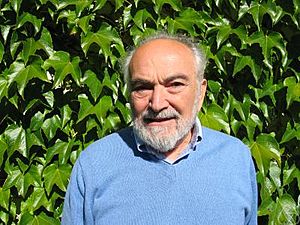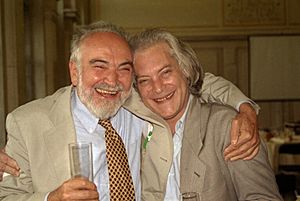Joel Lebowitz facts for kids
Quick facts for kids
Joel Lebowitz
|
|
|---|---|

Lebowitz at Oberwolfach, 2004
|
|
| Born | May 10, 1930 Tiachiv, Czechoslovakia (now Ukraine)
|
| Citizenship | American |
| Alma mater | Brooklyn College Syracuse University |
| Known for | Statistical Physics Statistical mechanics |
| Awards | Boltzmann Medal (1992) Henri Poincaré Prize (2000) Nicholson Medal (2004) Max Planck Medal (2007) Grande Médaille (2014) Dannie Heineman Prize for Mathematical Physics (2021) Dirac Medal (ICTP) (2022) |
| Scientific career | |
| Institutions | Rutgers University Yeshiva University Stevens Institute of Technology Yale University |
| Thesis | Statistical Mechanics of Nonequilibrium Processes. (1956) |
| Doctoral advisor | Peter G. Bergmann |
| Other academic advisors | Lars Onsager |
| Doctoral students | Michael Aizenman Sheldon Goldstein |
| Other notable students | de:Detlef Dürr |

Joel Louis Lebowitz, born on May 10, 1930, is a brilliant scientist. He is a mathematical physicist who has made big discoveries in how tiny particles behave. This field is called statistical physics. He has also contributed to many other areas of mathematics and physics.
He helped start the Journal of Statistical Physics, a science magazine. He also led the New York Academy of Sciences for a time. Today, he is a special professor of Math and Physics at Rutgers University. Beyond science, he cares deeply about human rights. He helps lead a group called the Committee of Concerned Scientists.
Contents
Joel Lebowitz's Early Life
Joel Lebowitz was born in 1930 in a place called Taceva, which was then in Czechoslovakia. This area is now part of Ukraine. During World War II, his family faced very difficult times. Sadly, he lost his father, mother, and younger sister in 1944.
After the war ended, he traveled by boat to the United States. There, he went to an Orthodox Jewish school. He also studied at Brooklyn College. He earned his PhD degree in 1956 from Syracuse University. His main teacher was Peter G. Bergmann.
His Journey in Science
After getting his PhD, Joel Lebowitz continued his research. He worked with another famous scientist, Lars Onsager, at Yale University. He later became a professor there. In 1957, he moved to the Stevens Institute of Technology in New Jersey. Then, in 1959, he joined Yeshiva University in New York City.
Finally, in 1977, he became a professor at Rutgers University. He still holds a special position there called the George William Hill Professor.
While at Yeshiva and Rutgers Universities, he met many other scientists and artists. In 1975, he started the Journal of Statistical Physics. This journal is a very important place for scientists to share their research. In 1979, he became the president of the New York Academy of Sciences. He has also been a strong supporter of scientists who faced difficulties in the former Soviet Union.
Joel Lebowitz's Scientific Work
Joel Lebowitz has made many important discoveries in science. With another scientist named Elliott Lieb, he showed how Coulomb interactions work in very large systems. This is important for understanding how matter behaves. He also developed special rules called Lebowitz inequalities. These rules help explain how magnets work at a tiny level.
His current research focuses on how systems behave when they are not in a perfect, balanced state. This area is called non-equilibrium statistical mechanics.
He was the main editor of the Journal of Statistical Physics from 1975 until 2018. He also hosts science conferences every two years. These conferences started at Yeshiva University and now happen at Rutgers University. They have been going on for over 60 years! He also helped edit a very important series of books called Phase Transitions and Critical Phenomena.
Awards and Honors
Joel Lebowitz has received many awards for his amazing work. Some of these include:
- The Boltzmann Medal (1992)
- The Nicholson Medal (2004) from the American Physical Society
- The Henri Poincaré Prize (2000)
- The Volterra Award (2001)
- The Dannie Heineman Prize for Mathematical Physics (2021)
In 2007, he received the Max Planck Medal. This award recognized his important work on how systems behave in and out of balance. It also honored him for encouraging new ideas in his field. In 2014, he received the Grande Médaille from the French Academy of Sciences. In 2022, he was awarded the Dirac Medal (ICTP).
Joel Lebowitz is a member of the United States National Academy of Sciences. This is a very high honor for scientists in the U.S. He also became a fellow of the American Physical Society in 1966. In 2012, he became a fellow of the American Mathematical Society.
In 2012, his old university, Syracuse University, gave him an honorary Doctor of Science degree.

